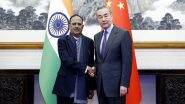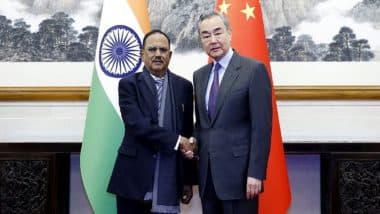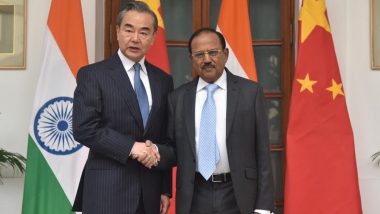New Delhi, January 24: Oil-to-telecom conglomerate Reliance Industries is evolving from an integrated energy company into a consumer giant like China's Alibaba and potentially could rival likes of Amazon and Walmart, says a report Thursday. India's No.1 oil refining and petrochemical company plans to roll out its online shopping platform that will combine its retail arm's nearly 10,000 stores in over 6,500 towns as well as neighbourhood retailers with its fast expanding mobile phone network that already has 28 crore subscribers.
"Our analysis suggests RIL can become a market leader in telecom and media, while gaining significant share in retail/e-commerce. "Its success could be built on an ecosystem or bundling strategy, and a home-court advantage, similar to Alibaba's success in China, beyond explicit or implicit policy support," brokerage firm UBS said. Reliance Industries Ltd Becomes First Indian Company to Cross Rs 8 Lakh Crore-Mark.
While Amazon's strong 'Prime' membership growth has been a key pillar of its business, Reliance has similarly built a strong telecom subscriber base. The company has already surprised investors by reaching a market-leading position in telecom within a short span of two-and-a-half years. Its edge in fixed broadband (FTTH) derives from low penetration, high capital intensity, a fibre roll-out lead, and content tie-ups. Reliance Industries Limited Overtakes TCS to Become the Most Valued Indian Company in Terms of M-Cap.
"In retail/e-commerce, despite competition from well-funded global companies, RIL's wide footprint of physical stores along with its omnichannel focus, subscriber reach and regulations governing foreign e-commerce entities could help it gain a 300 basis point market share in high-growth, modern retail," it said. The company's traditional energy businesses have funded the consumer segment and remain key to its market-leading position.
RIL, it said, can potentially become a unique quadruple play by bundling connectivity, carriage, content and commerce to gain higher share of consumers' wallet. Listing some comparables between Alibaba and Reliance, it said pursuing an ecosystem or a bundling strategy in a high-growth fragmented retail sector with lower online penetration and home-turf advantage are common to both.
Amazon's core value proposition to customers is its 'Prime' subscription, which offers free shipping and video and music content. "Our assessment of the capital framework, regulations, business positioning and emerging trends in each of its consumer-facing business indicates RIL can lead in telecom and media and gain significant share in retail/e-commerce," it said. "Can RIL evolve into India's Amazon/Alibaba/Walmart?," UBS asked and answered it with a "Yes."
Currently, the company's energy business contributes 75 per cent of its EBITDA. Consumer business accounts for the remaining 25 per cent. "We think there are many similarities between the India of today and the China of 10 years ago. India's retail landscape is fragmented, and there are significant demographic and socioeconomic differences from top to low-tier cities. "Online penetration is low in India, with e-commerce accounting for 2.3 per cent of retail sales in 2018; in comparison, China's e-commerce penetration is over 20 per cent currently. This means India is still not at the sweet spot for e-commerce adoption, where mainstream adopters shift rapidly to online spending and platforms experience hyper-growth," UBS said.
Reliance also has a 'home court' advantage. "There are now more supportive policies in India. India's e-commerce law should be supportive of domestic companies, including RIL. In China, Alibaba was also able to overtake a dominant eBay in the early days because it invested more both to sign up merchants and to acquire customers.
"Beyond any explicit or implicit policy support, we believe this home court advantage is important. Companies that have to justify years of heavy investments in a foreign market often at times will be less aggressive than a domestic one that has nowhere to go if it fails to gain traction," it added.













 Quickly
Quickly




















